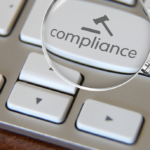Business ethics concentrate on the moral or ethical problems that can arise inside a business environment. Often when we’re at work, it’s easy to see right from wrong (e.g., stealing from the company or providing staff with unsafe working conditions). However, sometimes, business ethics exist inside a grey area, and that’s when things can become tricky. This eBook explains the importance of nurturing a code of ethics in the workplace, as ethics often exist often inside this grey area, responding and resonating with the changing standards and expectations of the organisation at large. Inside, we also explore where ethics meets compliance and the characteristics of an ethical workplace put into practice.
Learning points:
- The importance of setting an ethical tone from the top
- Why is having a code of ethics so useful?
- Where ethics meets your compliance culture
- Characteristics of an ethical culture
- Areas of ethics to consider in practice














